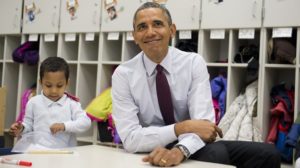Story by Claudio Sanchez
 Finland, a country the size of Minnesota, beats the U.S. in math, reading and science, even though Finnish children don’t start school until age 7.
Finland, a country the size of Minnesota, beats the U.S. in math, reading and science, even though Finnish children don’t start school until age 7.
Despite the late start, the vast majority arrive with solid reading and math skills. By age 15, Finnish students outperform all but a few countries on international assessments.
Krista Kiuru, Finland’s minister of education and science who met with education officials in Washington recently, chalks success up to what she calls the “Finnish way.” Every child in Finland under age 7 has the right to child care and preschool by law, regardless of family income. Over 97 percent of 3- to 6-year-olds attend a program of one type or another. But, says Kiuru, the key to Finland’s universal preschool system is quality.
“First of all, it’s about having high-quality teachers,” Kiuru says. “Day care teachers are having Bachelor degrees. So we trust our teachers, and that’s very, very important. And the third factor: we have strong values in the political level.”
Political consensus and support help, Kiuru says.
Author Amanda Ripley says she didn’t really believe it, so she went to Finland and several other top-performing countries to see for herself. She wrote The Smartest Kids in the World: And How They Got That Way. Compared to Singapore, South Korea or Japan, she says, Finland’s approach is pretty laid back, even though its standards — like what preschoolers should know and be able to do — are set by Finland’s National Curriculum Guidelines for early childcare.
